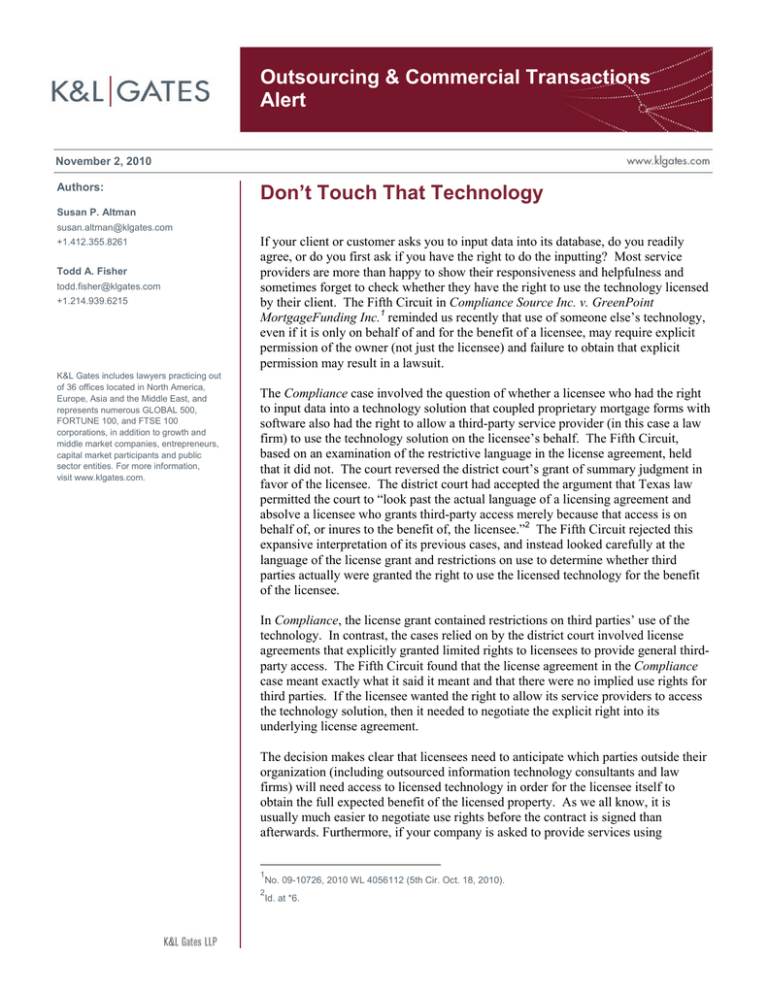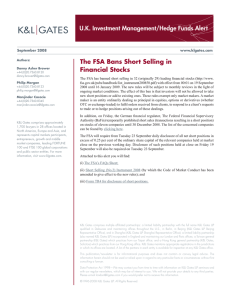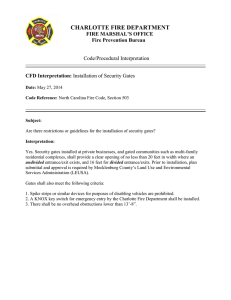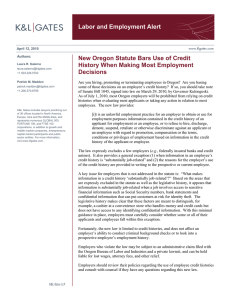
Outsourcing & Commercial Transactions
Alert
November 2, 2010
Authors:
Don’t Touch That Technology
Susan P. Altman
susan.altman@klgates.com
+1.412.355.8261
Todd A. Fisher
todd.fisher@klgates.com
+1.214.939.6215
K&L Gates includes lawyers practicing out
of 36 offices located in North America,
Europe, Asia and the Middle East, and
represents numerous GLOBAL 500,
FORTUNE 100, and FTSE 100
corporations, in addition to growth and
middle market companies, entrepreneurs,
capital market participants and public
sector entities. For more information,
visit www.klgates.com.
If your client or customer asks you to input data into its database, do you readily
agree, or do you first ask if you have the right to do the inputting? Most service
providers are more than happy to show their responsiveness and helpfulness and
sometimes forget to check whether they have the right to use the technology licensed
by their client. The Fifth Circuit in Compliance Source Inc. v. GreenPoint
MortgageFunding Inc.1 reminded us recently that use of someone else’s technology,
even if it is only on behalf of and for the benefit of a licensee, may require explicit
permission of the owner (not just the licensee) and failure to obtain that explicit
permission may result in a lawsuit.
The Compliance case involved the question of whether a licensee who had the right
to input data into a technology solution that coupled proprietary mortgage forms with
software also had the right to allow a third-party service provider (in this case a law
firm) to use the technology solution on the licensee’s behalf. The Fifth Circuit,
based on an examination of the restrictive language in the license agreement, held
that it did not. The court reversed the district court’s grant of summary judgment in
favor of the licensee. The district court had accepted the argument that Texas law
permitted the court to “look past the actual language of a licensing agreement and
absolve a licensee who grants third-party access merely because that access is on
behalf of, or inures to the benefit of, the licensee.”2 The Fifth Circuit rejected this
expansive interpretation of its previous cases, and instead looked carefully at the
language of the license grant and restrictions on use to determine whether third
parties actually were granted the right to use the licensed technology for the benefit
of the licensee.
In Compliance, the license grant contained restrictions on third parties’ use of the
technology. In contrast, the cases relied on by the district court involved license
agreements that explicitly granted limited rights to licensees to provide general thirdparty access. The Fifth Circuit found that the license agreement in the Compliance
case meant exactly what it said it meant and that there were no implied use rights for
third parties. If the licensee wanted the right to allow its service providers to access
the technology solution, then it needed to negotiate the explicit right into its
underlying license agreement.
The decision makes clear that licensees need to anticipate which parties outside their
organization (including outsourced information technology consultants and law
firms) will need access to licensed technology in order for the licensee itself to
obtain the full expected benefit of the licensed property. As we all know, it is
usually much easier to negotiate use rights before the contract is signed than
afterwards. Furthermore, if your company is asked to provide services using
1
No. 09-10726, 2010 WL 4056112 (5th Cir. Oct. 18, 2010).
2
Id. at *6.
Outsourcing and Commercial Transactions Alert
technology licensed to your client or customer, make
sure you have explicit use rights in the underlying
license.
information herein should not be used or relied
upon in regard to any particular facts or
circumstances without first consulting with a
lawyer.
This publication is for informational purposes only
and does not contain or convey legal advice. The
Anchorage Austin Beijing Berlin Boston Charlotte Chicago Dallas Dubai Fort Worth Frankfurt Harrisburg Hong Kong London
Los Angeles Miami Moscow Newark New York Orange County Palo Alto Paris Pittsburgh Portland Raleigh Research Triangle Park
San Diego San Francisco Seattle Shanghai Singapore Spokane/Coeur d’Alene Taipei Tokyo Warsaw
Washington, D.C.
K&L Gates includes lawyers practicing out of 36 offices located in North America, Europe, Asia and the Middle East, and represents numerous
GLOBAL 500, FORTUNE 100, and FTSE 100 corporations, in addition to growth and middle market companies, entrepreneurs, capital market
participants and public sector entities. For more information, visit www.klgates.com.
K&L Gates comprises multiple affiliated entities: a limited liability partnership with the full name K&L Gates LLP qualified in Delaware and
maintaining offices throughout the United States, in Berlin and Frankfurt, Germany, in Beijing (K&L Gates LLP Beijing Representative Office), in
Dubai, U.A.E., in Shanghai (K&L Gates LLP Shanghai Representative Office), in Tokyo, and in Singapore; a limited liability partnership (also named
K&L Gates LLP) incorporated in England and maintaining offices in London and Paris; a Taiwan general partnership (K&L Gates) maintaining an
office in Taipei; a Hong Kong general partnership (K&L Gates, Solicitors) maintaining an office in Hong Kong; a Polish limited partnership (K&L
Gates Jamka sp.k.) maintaining an office in Warsaw; and a Delaware limited liability company (K&L Gates Holdings, LLC) maintaining an office in
Moscow. K&L Gates maintains appropriate registrations in the jurisdictions in which its offices are located. A list of the partners or members in each
entity is available for inspection at any K&L Gates office.
This publication is for informational purposes and does not contain or convey legal advice. The information herein should not be used or relied upon
in regard to any particular facts or circumstances without first consulting a lawyer.
©2010 K&L Gates LLP. All Rights Reserved.
November 2, 2010
2





